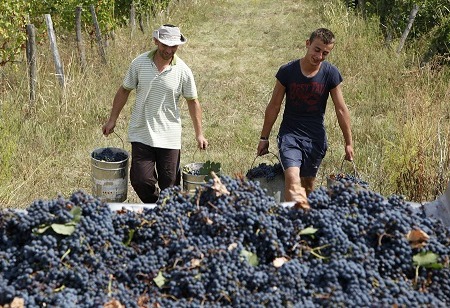Winemakers not intend fully switch to Russian market


Rtveli is the grape harvest alert! It is time for Besik Mekokishvili, who is a farmer from Gurjaani in the wine-producing region of Kakheti in eastern Georgia, to pick grapes from the vineyards. As Mekokishvili expected, due to weather problems this year, the harvest would not be perfect but the wine would flow.
"The last years rain, hailstones and storms caused damages to vines in the district but expect eight tons of black grapes from a two hectare area, while three years ago(they) even harvested 12 tons, said Mekokishvili while carring a heavy grape filled bucket.

Since the harvest is in full swing, Mekokishvili thinks that farmers will not have problems with selling this year. He has already discussed selling the black grapes to a private wine producer company for 1.20 GEL per kilo.
"I remember the past few years when the grape growers in Kakheti, like me, had problem selling the grapes because there was no demand from wine producers for grapes. But with the help of governmental subsidiaries we managed to survive, noted Mekokishvili.
State support
The state assigned 25 million GEL in subsidies to wine-makers this year. The government pays 0.40 GEL to a farmer per kilogram of Rkatsiteli and Kakhuri Mtsvane, the types of white grapes sold to factory and 0.25 GEL for Saperavi(black grape).
According to the Georgian Ministry of Agriculture, the average price for Rkatsiteli is 1.00 GEL and 1.20 GEL for Saperavi, which is a bit higher in comparison to last year.
The wine-making companies have the opportunity use the preferential agro-credit, a loan for the purchase of grapes. The credit will be issued to those wine-making companies who pay 1 GEL and over per kilogram of grapes. With the subsidized loan, the vine-growers will be able to attract a 15-month capital with an annual of 12%-15% but 9% of which will be covered by the government. The preferential resource helps companies turnover their capital.
As of today, wineries are bringing in Kindzmarauli, Tsinandali, Axasheni, Mtsvane, Rkatsiteli, Saferavi and several other varieties of grapes. Furthermore, 79 private and two state-owned wine plants purchase the grapes from farmers. The wine company, Marnis Kari is among those who plan to purchase grapes from the Kakheti and Racha regions.
"We decided to purchase more grapes this year and have already purchased 1,500 tons of white grapes and 500 tons of black grapes from the Kakheti region, said Ketevan Aladashvili, the Winemaker at Marnis Kari. She added that in the Racha region, the company would purchase the black grape (Aleksandrouli) but the highest price for it is 5 GEL, while last year it was only 3 GEL.

Market diversification
According to Aladashvili, one of the reasons for purchasing more grapes this year was the expandsion into new markets, including Russia. In the last three months, Marnis Kari has delivered half a million bottles of wine to the Russian market.
In 2006, Georgia was sharply affected by Russias ban on wine imports. They stated the products were harmful for humans and did not meet sanitary norms. Since then, the issue of the two countries' trade relations has been politicised. This summer, Georgian wine reentered the Russian market. The trade relations between the two countries began to improve after the parliamentary elections in October 2012 when the coalition Georgian Dream(GD) came into power.
Russia was once Georgia's biggest market. Prior to the embargo, 74% of Georgian wine was exported to Russia. Currently, the growing export destination countries include Ukraine, Poland, Kazakhstan, the Baltic countries, the United States, Turkey, China and Germany.
Winemakers are optimistically looking at the Russian market but dont intend to give up the diversification processes in new markets and expansion of the existing ones.
"We exported more than half million bottles of wine to Russia but our main trade partner countries are Germany, Latvia, Lithuania, Estonia, Ukraine, Great Britain, Belarus, Kazakhstan, Taiwan and China where we will continue export, said Eka Khmiadashvili, the Export Manager of Kakhetian Traditional Winemaking (KTW).|/
KTW produced 10 million bottles of wine this year and nearly 90% of the production was exported. This autumn, the company opened a new wine producing plant in the Sagarejo district in Kakheti, that will produce 12 million bottles annually.
 According to their statistics of The National Wine Agency of Georgia, a state funded organization responsible for assisting the development of the wine sector, since June this year, more than 7 million bottles of wine have been exported to Russia.
According to their statistics of The National Wine Agency of Georgia, a state funded organization responsible for assisting the development of the wine sector, since June this year, more than 7 million bottles of wine have been exported to Russia.
Grape and wine at a glance
 Up to 150 thousand tons of grapes are expected to be harvested this year, according to preliminary figures from Rtveli 2013 which is a coordination center for grape vintage. The 2012 grape harvest totaled 144 thousand tons. According to recent data, up to 92 thousand tons of grapes have been produced by the wine producer companies this season. Only farmers in the Kakheti region received more than 100 million GEL from selling the grapes.
Up to 150 thousand tons of grapes are expected to be harvested this year, according to preliminary figures from Rtveli 2013 which is a coordination center for grape vintage. The 2012 grape harvest totaled 144 thousand tons. According to recent data, up to 92 thousand tons of grapes have been produced by the wine producer companies this season. Only farmers in the Kakheti region received more than 100 million GEL from selling the grapes.
The total production of wine in 2012 equaled 40.375 million liters and was worth 130 million GEL, which representing a growth of 39% from 2011.
In 2012, an export equaled 20,230 million liters of wine and was worth around 64 million USD, representing a growth of 16% from 2011.
 Tweet
Tweet  Share
Share